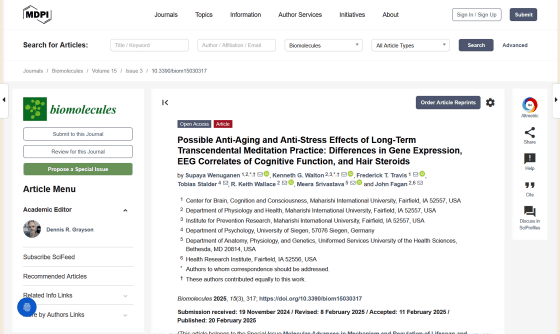Study finds that people who meditate for decades experience less stress and age more slowly

Meditation is said to have effects such as relaxation and stress reduction, and has been attracting attention in various fields in recent years. Recently, research results have been reported that people who have practiced
Possible Anti-Aging and Anti-Stress Effects of Long-Term Transcendental Meditation Practice: Differences in Gene Expression, EEG Correlates of Cognitive Function, and Hair Steroids
https://www.mdpi.com/2218-273X/15/3/317

Long-term practice of Transcendental Meditation may reduce both stress and aging | EurekAlert!
https://www.eurekalert.org/news-releases/1078719
Long-Term Meditation May Reduce Stress And Aging, Study Suggests : ScienceAlert
https://www.sciencealert.com/long-term-meditation-may-reduce-stress-and-aging-study-suggests
Transcendental Meditation is a meditation technique popularized by the Indian Maharishi Mahesh Yogi in the 1950s, and is said to calm the mind, lead the consciousness to a deeper level, and reach pure consciousness by chanting a mantra in one's mind twice a day for 15 to 20 minutes. In principle, it requires instruction by a specialized instructor, and the details of the content are not made public.
A research team from Maharishi International University and the Uniformed Services University in the United States investigated gene expression, cognitive function, and levels of the stress hormone (cortisol) in the hair of 56 Transcendental Meditation practitioners across two age groups: one who had been practicing the Transcendental Meditation technique for an average of 12 years and one who had been practicing it for an average of 40 years, as well as people who did not practice the Transcendental Meditation technique.

The analysis revealed that gene expression related to inflammation and aging was lower in Transcendental Meditation practitioners than in the general population. Genes with different expression between the general population and Transcendental Meditation practitioners included
The researchers also used electroencephalography to measure cognitive processing speed, and found that older Transcendental Meditation practitioners had processing speeds similar to those of younger subjects. Furthermore, Transcendental Meditation practitioners scored higher on the Brain Integration Scale (BIS), a comprehensive measure of cognitive performance that includes reaction time, brainwave coherence, a measure of communication between different brain regions, and attention.
'The cognitive findings are particularly exciting because both younger and older meditators had higher BIS scores than non-meditators,' said Frederick Travis , a co-author of the paper and a biological psychologist at Maharishi International University, arguing that the Transcendental Meditation technique may have a protective effect against age-related cognitive decline.

Analysis of the levels of cortisol and its inactive precursor,
'Cortisol plays a key role in the body's response to stress, and chronically high cortisol levels are associated with many health problems related to aging as well as declining cognitive function,' said study co-author Kenneth Walton , a senior research fellow at Maharishi International University. 'The lower cortisol ratio in meditators suggests they have more adaptive reserve, and more resilience, contributing to their overall health and longevity.'

It should be noted that the results of this study are based on observational data and do not suggest a direct causal relationship. For example, Transcendental Meditation practitioners may be more health-conscious than non-practitioners, or may have unknown characteristics that contribute to health.
Related Posts:
in Science, Posted by log1h_ik







